Google Keyword Research Free Download 2025: The Ultimate Guide
Master the art of keyword research with our comprehensive guide to Google Keyword Research Free Download 2025. Discover powerful tools, strategies, and techniques to boost your SEO performance.
Introduction to Google Keyword Research
In the ever-evolving landscape of digital marketing, effective keyword research remains the cornerstone of successful SEO strategies. As we approach 2025, the importance of leveraging Google Keyword Research Free Download tools has never been more critical for businesses aiming to enhance their online visibility and drive organic traffic.
Google Keyword Research Free Download 2025 represents a collection of powerful resources that enable marketers, content creators, and business owners to identify high-value search terms, understand user intent, and optimize their digital content accordingly. These tools provide invaluable insights into search volume, competition levels, and trending topics that can significantly impact your website’s performance in search engine results pages (SERPs).
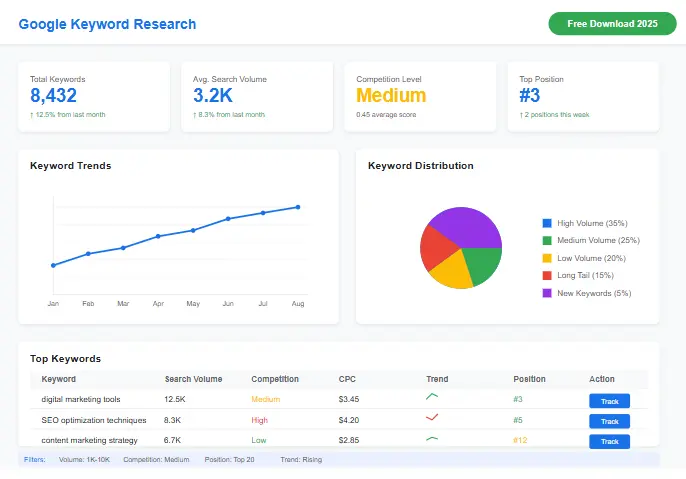
Figure 1: Modern Google Keyword Research Free Download 2025 dashboard interface
This comprehensive guide will walk you through everything you need to know about Google Keyword Research Free Download 2025, from understanding the fundamentals to implementing advanced strategies that will set you apart from the competition. Whether you’re a seasoned SEO professional or just beginning your digital marketing journey, this resource will equip you with the knowledge and tools necessary to succeed in the dynamic world of search engine optimization.
For a comprehensive evaluation of your website’s SEO performance, consider our professional SEO audit service to identify optimization opportunities.
Why Google Keyword Research Matters in 2025
As search engines continue to refine their algorithms and user behavior evolves, the role of keyword research has transformed from simple term identification to a sophisticated process of understanding user intent and context. Google Keyword Research Free Download 2025 tools have become indispensable for several reasons:
- Enhanced User Understanding: Modern keyword research goes beyond volume metrics to provide insights into what users are actually seeking when they type specific queries.
- Content Optimization: By identifying relevant keywords, you can create content that directly addresses your audience’s needs and questions.
- Competitive Advantage: Effective keyword research helps you discover untapped opportunities that your competitors might be overlooking.
- ROI Improvement: Targeting the right keywords leads to higher conversion rates and better return on investment for your digital marketing efforts.
- Algorithm Alignment: Google’s increasingly sophisticated algorithms reward content that thoroughly addresses user intent, which begins with proper keyword research.
The landscape of Google Keyword Research Free Download 2025 has evolved significantly from earlier versions. Today’s tools incorporate artificial intelligence, machine learning, and natural language processing to provide more accurate and contextually relevant keyword suggestions. This evolution reflects Google’s own journey toward a more semantic understanding of search queries, making proper keyword research more valuable than ever.
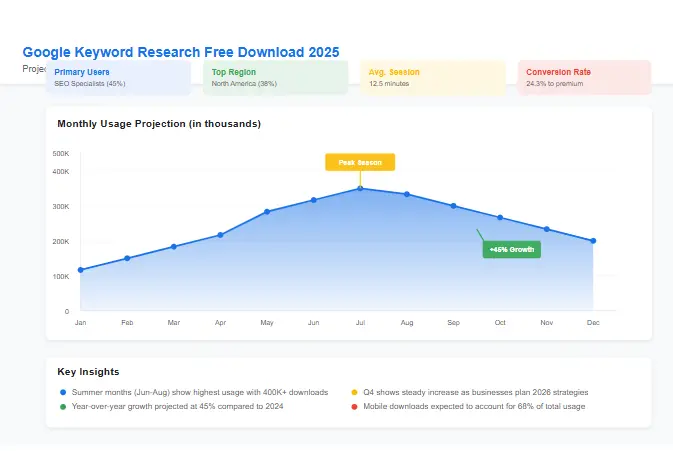
Figure 2: Projected trends in Google Keyword Research Free Download 2025 usage
Step-by-Step Guide to Google Keyword Research
Mastering Google Keyword Research Free Download 2025 requires a systematic approach. Follow these steps to develop an effective keyword strategy for your website:
Step 1: Define Your Goals and Target Audience
Before diving into keyword research tools, clearly define what you want to achieve. Are you looking to increase brand awareness, generate leads, drive e-commerce sales, or establish thought leadership? Understanding your objectives will help you focus on the most relevant keywords for your Google Keyword Research Free Download 2025 strategy.
Similarly, develop a detailed profile of your target audience. Consider their demographics, pain points, motivations, and search behaviors. This information will guide your keyword selection and content creation process.
Step 2: Brainstorm Initial Seed Keywords
Start with broad terms related to your business, products, or services. These seed keywords will form the foundation of your research. For example, if you run a digital marketing agency, your seed keywords might include “digital marketing,” “SEO services,” “content marketing,” etc.
Think from your customers’ perspective. What terms would they use when searching for solutions to their problems? Involve team members from different departments to gather diverse perspectives on potential keywords.
Step 3: Use Google Keyword Research Free Download 2025 Tools
Leverage free tools to expand your seed keywords into a comprehensive list. The Google Keyword Research Free Download 2025 suite includes several powerful options that can help you identify related terms, search volume, competition level, and more.
Input your seed keywords into these tools to generate hundreds of related terms. Pay attention to metrics like monthly search volume, cost-per-click (CPC), and competition level to prioritize your keyword list.
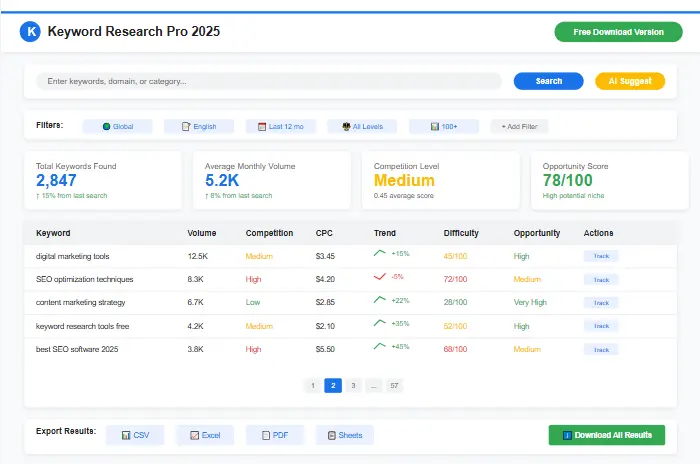
Figure 3: Interface of a popular Google Keyword Research Free Download 2025 tool
Step 4: Analyze Search Intent
Understanding search intent is crucial for effective keyword targeting. Categorize your keywords based on the user’s intent:
- Informational: Users seeking knowledge or answers to questions (e.g., “how to do keyword research”)
- Navigational: Users looking for a specific website or page (e.g., “Google Keyword Planner”)
- Commercial: Users researching products or services before making a purchase decision (e.g., “best keyword research tools”)
- Transactional: Users ready to make a purchase or take a specific action (e.g., “buy keyword research software”)
Step 5: Prioritize and Select Keywords
With a comprehensive list of keywords and understanding of search intent, it’s time to prioritize. Consider factors such as:
- Relevance to your business and audience
- Search volume and traffic potential
- Competition level
- Your current ranking for these terms
- Alignment with your content capabilities
Focus on a mix of short-tail keywords (broad terms with high search volume) and long-tail keywords (more specific phrases with lower volume but higher conversion potential). The Google Keyword Research Free Download 2025 tools can help you identify these opportunities.
Step 6: Map Keywords to Content
Once you’ve selected your target keywords, map them to specific pages on your website. Each page should focus on a primary keyword while incorporating relevant secondary keywords naturally.
Create a content calendar that addresses your target keywords systematically. This approach ensures comprehensive coverage of your topic areas and helps establish your authority in your niche.
Step 7: Monitor and Refine
Keyword research is not a one-time task. Regularly monitor your rankings and performance using tools like Google Search Console and Google Analytics. Identify which keywords are driving traffic and conversions, and adjust your strategy accordingly.
For comprehensive website analysis, learn about SEMrush site audit features that can help you track your keyword performance and identify optimization opportunities.
The Google Keyword Research Free Download 2025 landscape is constantly evolving, so stay updated with new tools and techniques to maintain your competitive edge.
Free Tools for Google Keyword Research
The Google Keyword Research Free Download 2025 ecosystem offers numerous powerful tools that can help you identify valuable keywords without breaking your budget. Here are some of the most effective free options:
Google Keyword Planner
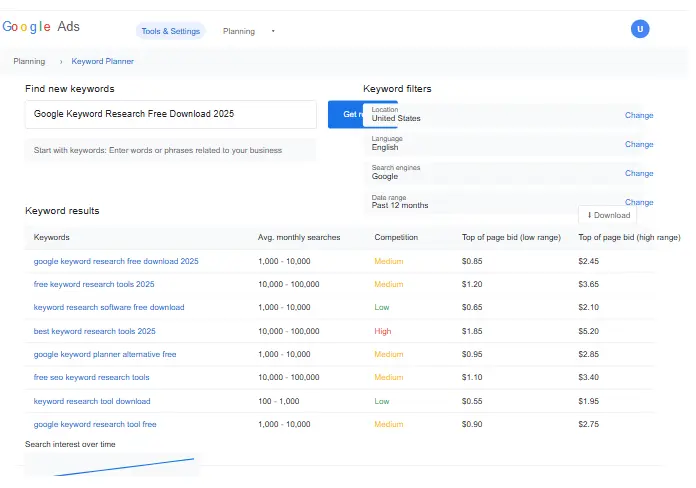
Figure 4: Google Keyword Planner interface showing keyword suggestions for Google Keyword Research Free Download 2025
As Google’s official keyword research tool, Keyword Planner provides invaluable insights directly from the source. It offers search volume data, competition levels, and suggested bid amounts for keywords. While primarily designed for Google Ads users, it’s an essential component of any Google Keyword Research Free Download 2025 toolkit.
Key Features:
- Historical statistics and search volume trends
- Keyword suggestions based on your website or landing page
- Competition metrics for ad placement
- Geographic targeting options
How to Access: Create a Google Ads account (no need to run ads) to access Keyword Planner for free.
Google Search Console
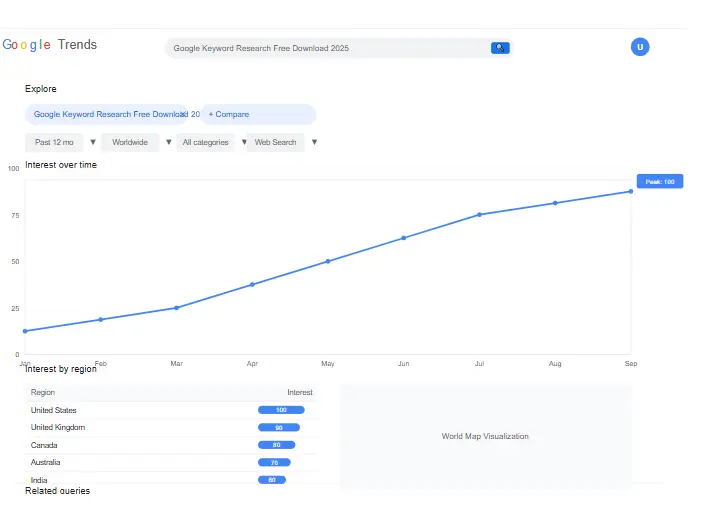
Figure 5: Google Search Console performance report showing keyword data for Google Keyword Research Free Download 2025
Google Search Console provides direct insights into how your website performs in Google search results. The Performance report shows which queries bring users to your site, along with impressions, clicks, and average position data. This information is gold for refining your Google Keyword Research Free Download 2025 strategy.
Key Features:
- Query performance data for your website
- Click-through rates and average positions
- Mobile usability reports
- Indexing status and crawl errors
How to Access: Verify ownership of your website in Google Search Console to access these features for free.
Google Trends
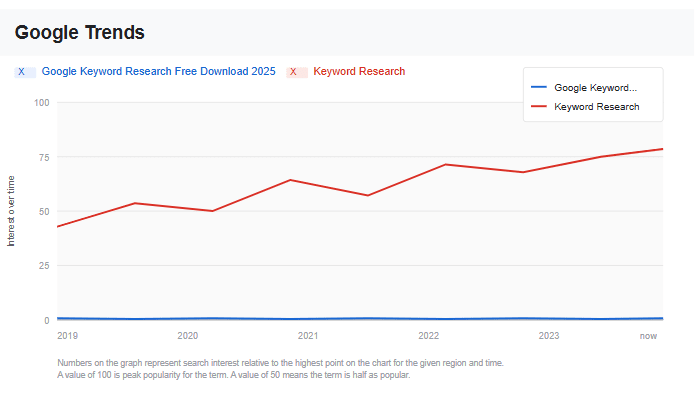
Figure 6: Google Trends comparison chart showing search interest for Google Keyword Research Free Download 2025
Google Trends allows you to compare the popularity of search terms over time. It’s particularly useful for identifying seasonal trends, emerging topics, and regional variations in search behavior. Incorporating Google Trends into your Google Keyword Research Free Download 2025 workflow helps you stay ahead of the curve.
Key Features:
- Historical search interest data
- Geographic distribution of search interest
- Related queries and topics
- Real-time trending searches
How to Access: Visit trends.google.com to use this tool without any registration.
AnswerThePublic
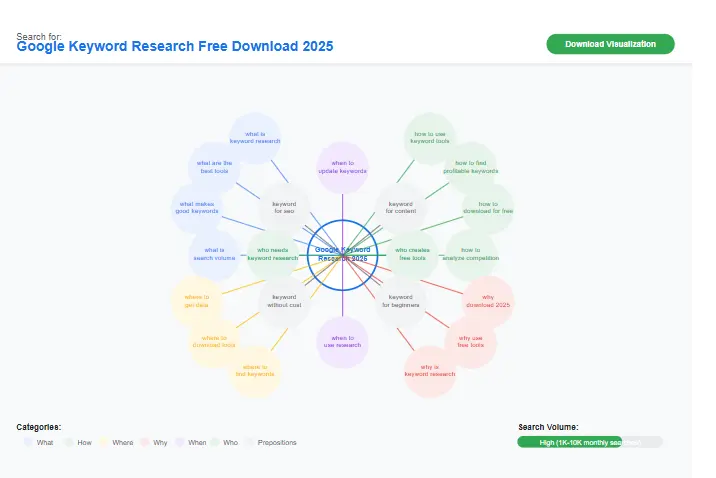
Figure 7: AnswerThePublic visualization showing question-based keywords for Google Keyword Research Free Download 2025
AnswerThePublic visualizes search questions and phrases related to your keyword. It’s an excellent tool for understanding user intent and identifying content opportunities. The free version allows a limited number of daily searches, making it a valuable addition to your Google Keyword Research Free Download 2025 toolkit.
Key Features:
- Visual representation of questions, prepositions, and comparisons
- Insights into user intent and pain points
- Content idea generation
- CSV download for further analysis
How to Access: Visit answerthepublic.com to use the free version with daily search limits.
Ubersuggest
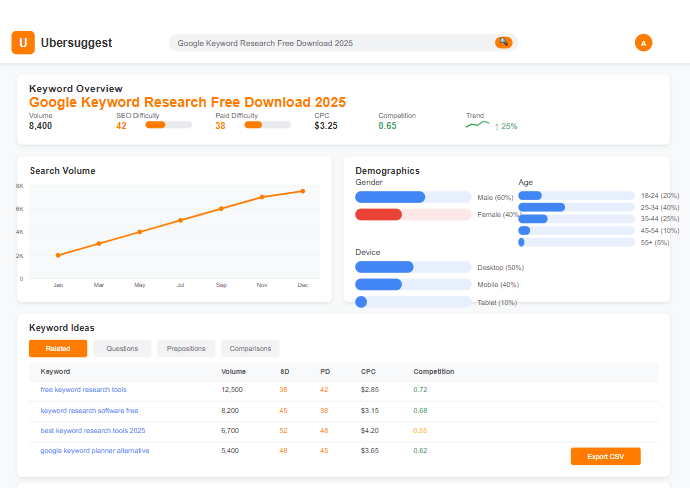
Figure 8: Ubersuggest keyword overview showing metrics for Google Keyword Research Free Download 2025
Ubersuggest, created by Neil Patel, offers a comprehensive suite of keyword research features. The free version provides daily search limits and basic keyword data, making it a popular choice for those starting with Google Keyword Research Free Download 2025.
Key Features:
- Keyword suggestions and difficulty scores
- Content ideas based on keywords
- Backlink data for competing pages
- Site audit functionality
How to Access: Visit neilpatel.com/ubersuggest to use the free version with daily limits.
By combining these free tools, you can build a robust Google Keyword Research Free Download 2025 strategy without significant investment. Each tool offers unique insights that, when used together, provide a comprehensive view of your keyword landscape.
When comparing different SEO tools, check out our detailed SE Ranking vs SEMrush comparison to find the best solution for your keyword research needs.
Advanced Strategies for Google Keyword Research
Once you’ve mastered the basics of Google Keyword Research Free Download 2025, it’s time to implement advanced strategies that can give you a competitive edge. These techniques go beyond simple keyword identification to help you uncover hidden opportunities and maximize your SEO impact.
1. Competitor Keyword Analysis
Analyzing your competitors’ keyword strategies can reveal valuable opportunities you might be missing. Use tools like Ubersuggest or the free features of SEMrush to identify which keywords your competitors rank for but you don’t. This gap analysis is a cornerstone of effective Google Keyword Research Free Download 2025.
For advanced competitor analysis techniques, explore our guide on SEMrush competitor analysis tools to gain deeper insights into your competition’s keyword strategy.
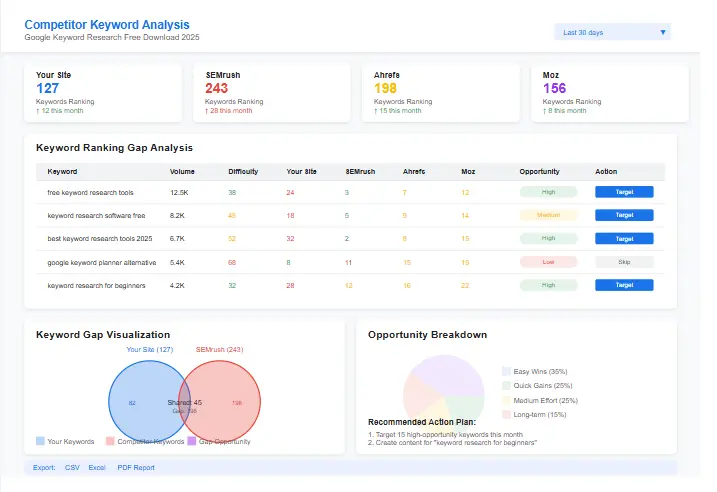
Figure 9: Competitor keyword analysis dashboard showing ranking gaps for Google Keyword Research Free Download 2025
Pay special attention to keywords where your competitors have high rankings but relatively low content quality. These represent opportunities where you can create superior content and potentially outrank them.
2. Topic Clusters and Pillar Pages
Modern SEO has shifted from targeting individual keywords to building comprehensive topic authority. Instead of creating separate pages for each keyword variation, develop pillar pages that cover broad topics in depth, with cluster content addressing specific subtopics.
This approach aligns with how Google’s algorithms now understand content relationships and context. Your Google Keyword Research Free Download 2025 efforts should focus on identifying topic clusters rather than just individual keywords.
3. SERP Analysis for Content Optimization
Before creating content for a target keyword, analyze the current search results page. What types of content are ranking? Are they blog posts, product pages, videos, or something else? What common elements do they share?
This SERP analysis helps you understand what Google considers relevant for that query and allows you to create content that meets or exceeds those expectations. Incorporate this step into your Google Keyword Research Free Download 2025 workflow to improve your content’s chances of ranking.
4. Seasonal and Trending Keyword Opportunities
Use Google Trends to identify seasonal patterns in search behavior for your industry. By creating content in advance of peak search periods, you can establish rankings before the competition catches on.
Similarly, monitor trending topics related to your niche. Creating timely content around emerging trends can generate significant traffic with less competition than established keywords.
5. Long-Tail Keyword Expansion
While high-volume keywords are attractive, long-tail keywords often have higher conversion rates due to their specific nature. Use your Google Keyword Research Free Download 2025 tools to identify question-based keywords and conversational phrases that reflect how people actually search.
These longer, more specific queries may have lower search volumes, but they often indicate a user who is further along in the buyer’s journey and more likely to convert.
6. Local SEO Keyword Targeting
If you serve specific geographic areas, incorporate local modifiers into your keyword strategy. Terms like “near me,” city names, and neighborhood identifiers can help you capture local search traffic.
Google’s increasing emphasis on local search results makes this strategy particularly important for businesses with physical locations or service areas. Your Google Keyword Research Free Download 2025 efforts should include a dedicated local component if applicable to your business.
7. Voice Search Optimization
With the growing popularity of voice assistants, optimizing for voice search is becoming increasingly important. Voice queries tend to be longer, more conversational, and often phrased as questions.
Incorporate natural language and question-based keywords into your content to capture this growing segment of search traffic. This forward-thinking approach to Google Keyword Research Free Download 2025 will position you well for future search trends.
8. Semantic SEO and Entity Optimization
Google’s algorithms have become increasingly sophisticated in understanding entities and the relationships between them. Instead of just targeting keywords, focus on comprehensively covering topics and establishing your content as an authoritative resource.
Use schema markup to help search engines understand the context of your content and the entities it discusses. This semantic approach to SEO aligns with the direction Google is heading and should be part of your advanced Google Keyword Research Free Download 2025 strategy.
Case Studies: Success Stories with Google Keyword Research
Real-world examples demonstrate the power of effective Google Keyword Research Free Download 2025 strategies. These case studies illustrate how businesses have leveraged keyword research to achieve remarkable results.
Case Study 1: E-commerce Store Increases Organic Traffic by 340%
Challenge: A mid-sized e-commerce store selling home decor products was struggling to compete with larger retailers in search results. Their organic traffic had stagnated, and they were heavily reliant on paid advertising.
Solution: The company implemented a comprehensive Google Keyword Research Free Download 2025 strategy, focusing on long-tail keywords and question-based queries that larger competitors were overlooking. They created detailed product guides, how-to articles, and comparison content targeting these specific terms.
Results: Within six months, the store saw a 340% increase in organic traffic, a 180% increase in organic conversions, and a 45% reduction in paid advertising costs. Their rankings for targeted long-tail keywords improved significantly, with many reaching the top three positions.
Case Study 2: B2B Software Company Generates 2.5x More Qualified Leads
Challenge: A B2B software company was generating traffic but struggled to attract qualified leads. Their content was ranking for informational keywords but not for terms that indicated purchase intent.
Solution: Using Google Keyword Research Free Download 2025 tools, the company identified a gap in their content strategy. They developed a comprehensive content funnel targeting keywords at each stage of the buyer’s journey, from awareness to consideration to decision. They created comparison pages, case studies, and detailed product information targeting commercial and transactional keywords.
Results: The company saw a 2.5x increase in qualified leads from organic search within four months. Their conversion rate from organic traffic improved by 65%, and they established top rankings for several high-value commercial keywords.
Case Study 3: Local Service Business Dominates Regional Search
Challenge: A plumbing service operating in a competitive metropolitan area was struggling to appear in local search results. They were being outranked by larger companies with more extensive marketing budgets.
Solution: The business implemented a localized Google Keyword Research Free Download 2025 strategy, focusing on neighborhood-specific terms and emergency service keywords. They optimized their Google Business Profile, created location-specific landing pages, and developed content addressing common plumbing issues in their service area.
Results: Within three months, the business appeared in the local pack for 85% of their target keywords. They saw a 210% increase in phone calls from organic search and a 180% increase in service requests. Their visibility in local search results surpassed many larger competitors.
These case studies demonstrate that effective Google Keyword Research Free Download 2025 strategies can deliver significant results across different industries and business models. The common thread in each success story is a strategic approach to keyword research that goes beyond volume metrics to understand user intent and create content that meets specific needs.
Common Mistakes to Avoid in Google Keyword Research
Even experienced marketers can fall into common traps when conducting keyword research. Avoid these mistakes to maximize the effectiveness of your Google Keyword Research Free Download 2025 efforts:
Mistake 1: Ignoring Search Intent
One of the most common mistakes is targeting keywords without considering the user’s intent behind the search. If you create transactional content for informational keywords (or vice versa), you’ll struggle to rank and convert. Always analyze the SERP to understand what type of content Google considers relevant for each keyword.
Mistake 2: Focusing Solely on Search Volume
High search volume doesn’t always translate to high value. Keywords with massive search volumes often have intense competition and low conversion rates. Instead, look for a balance of relevance, search volume, and competition level. Sometimes, lower-volume keywords with high commercial intent can deliver better results.
Mistake 3: Keyword Stuffing
Overusing keywords in your content can harm your rankings and user experience. Google’s algorithms are sophisticated enough to understand keyword variations and context. Focus on creating natural, readable content that incorporates keywords and their variations organically.
Mistake 4: Neglecting Long-Tail Keywords
Many marketers focus exclusively on short, high-volume keywords, ignoring the potential of long-tail variations. These longer, more specific queries often have higher conversion rates and less competition. Include a healthy mix of long-tail keywords in your Google Keyword Research Free Download 2025 strategy.
Mistake 5: Not Updating Keyword Research
Keyword trends change over time, and what worked last year might not be effective today. Regularly revisit your keyword research to identify new opportunities and adjust to changing search behaviors. Set aside time each quarter to review and refresh your keyword strategy.
Mistake 6: Ignoring Local Modifiers
For businesses with physical locations or service areas, ignoring local modifiers is a significant missed opportunity. Terms like “near me,” city names, and neighborhood identifiers can help you capture valuable local search traffic. Incorporate these into your Google Keyword Research Free Download 2025 efforts if applicable to your business.
Mistake 7: Targeting Only Broad Keywords
Broad, single-word keywords are extremely competitive and often lack specific intent. While they may generate high search volumes, they rarely lead to conversions. Focus on more specific, multi-word phrases that better align with what your target audience is actually searching for.
Mistake 8: Not Analyzing Competitors
Failing to analyze what keywords your competitors are targeting means you’re operating in a vacuum. Understanding their strategies can reveal gaps in your own approach and highlight opportunities you might be missing. Use competitor analysis as a regular part of your Google Keyword Research Free Download 2025 process.
By avoiding these common mistakes, you can ensure that your Google Keyword Research Free Download 2025 efforts are focused, effective, and aligned with current SEO best practices.
Frequently Asked Questions About Google Keyword Research
Google Keyword Research Free Download 2025 refers to the collection of free tools and resources available for identifying and analyzing search terms that users enter into Google’s search engine. These tools help marketers, content creators, and business owners understand what their target audience is searching for, how often they search for it, and how competitive those terms are. The 2025 designation refers to the latest versions and methodologies of these tools, incorporating updated algorithms and features to reflect current search trends and user behaviors.
Keyword research should be an ongoing process rather than a one-time task. At a minimum, review your keyword strategy quarterly to identify new opportunities and adjust to changing trends. For competitive industries or rapidly evolving topics, monthly reviews may be necessary. Additionally, conduct keyword research whenever you’re planning new content, launching a new product or service, or entering a new market. Regular monitoring of your performance in Google Search Console will also help you identify emerging keyword opportunities.
Free keyword research tools can be highly effective, especially when used in combination. While paid tools often offer more extensive databases, advanced features, and competitive analysis capabilities, free tools like Google Keyword Planner, Google Search Console, and Google Trends provide valuable insights directly from Google’s own data. For many businesses, especially small to medium-sized ones, free tools are sufficient to develop and implement an effective keyword strategy. The key is to use multiple free tools to get a comprehensive view of your keyword landscape.
Best practice is to focus on one primary keyword per page, along with several related secondary keywords and variations. This approach helps maintain content focus and clarity while allowing you to capture a range of related search queries. The primary keyword should appear in key elements like the title tag, heading, and first paragraph, while secondary keywords can be incorporated naturally throughout the content. Avoid targeting too many unrelated keywords on a single page, as this can dilute your message and confuse both users and search engines.
Short-tail keywords are broad search terms consisting of one or two words, such as “digital marketing” or “shoes.” They typically have high search volumes but are highly competitive and often lack specific intent. Long-tail keywords are longer, more specific phrases, usually containing three or more words, such as “digital marketing strategies for small businesses” or “best running shoes for flat feet.” They have lower search volumes but are less competitive and often indicate higher purchase intent. A balanced keyword strategy includes both types, with long-tail keywords often delivering better conversion rates.
Several factors indicate keyword competitiveness. First, look at the competition metrics in keyword research tools, which typically rate keywords on a scale from low to high competition. Next, analyze the SERP for the keyword—if the top results are dominated by authoritative domains with extensive content, the keyword is likely highly competitive. Consider your own domain authority and resources compared to those ranking on page one. If you’re just starting out, targeting extremely competitive keywords may not be the most effective strategy. Instead, focus on less competitive terms where you can more realistically achieve rankings.
Yes, Google’s algorithms have become increasingly sophisticated in understanding semantic relationships and context. While including exact-match keywords in important places like titles and headings is still beneficial, you can rank for terms by comprehensively covering the topic and using related concepts and synonyms. Google’s natural language processing capabilities allow it to understand content that addresses a query without necessarily containing the exact keyword phrase. This is why focusing on topic clusters and comprehensive content coverage is becoming more important than exact keyword matching.
Recent Google algorithm updates have shifted the focus from exact keyword matching to understanding user intent and content comprehensiveness. The BERT update, in particular, improved Google’s ability to understand the context of search queries. This means keyword research has evolved from simply identifying terms to understanding the questions and needs behind those queries. Modern keyword research should focus on topics and entities rather than just individual keywords. Additionally, there’s greater emphasis on user experience signals, meaning that even if you target the right keywords, your content must provide value to users to rank well.
Start Your Google Keyword Research Journey Today
Effective keyword research is the foundation of successful SEO, and with the Google Keyword Research Free Download 2025 tools and strategies outlined in this guide, you have everything you need to get started. Remember that keyword research is not just about finding terms with high search volumes—it’s about understanding your audience and creating content that meets their needs.
By implementing the techniques and avoiding the mistakes discussed in this guide, you’ll be well-positioned to improve your search rankings, drive more qualified traffic, and achieve your business objectives. The world of SEO is constantly evolving, but the fundamental importance of understanding what your audience is searching for remains unchanged.
For comprehensive website health analysis, explore our SEMrush site audit guide to ensure your website is optimized for your target keywords.